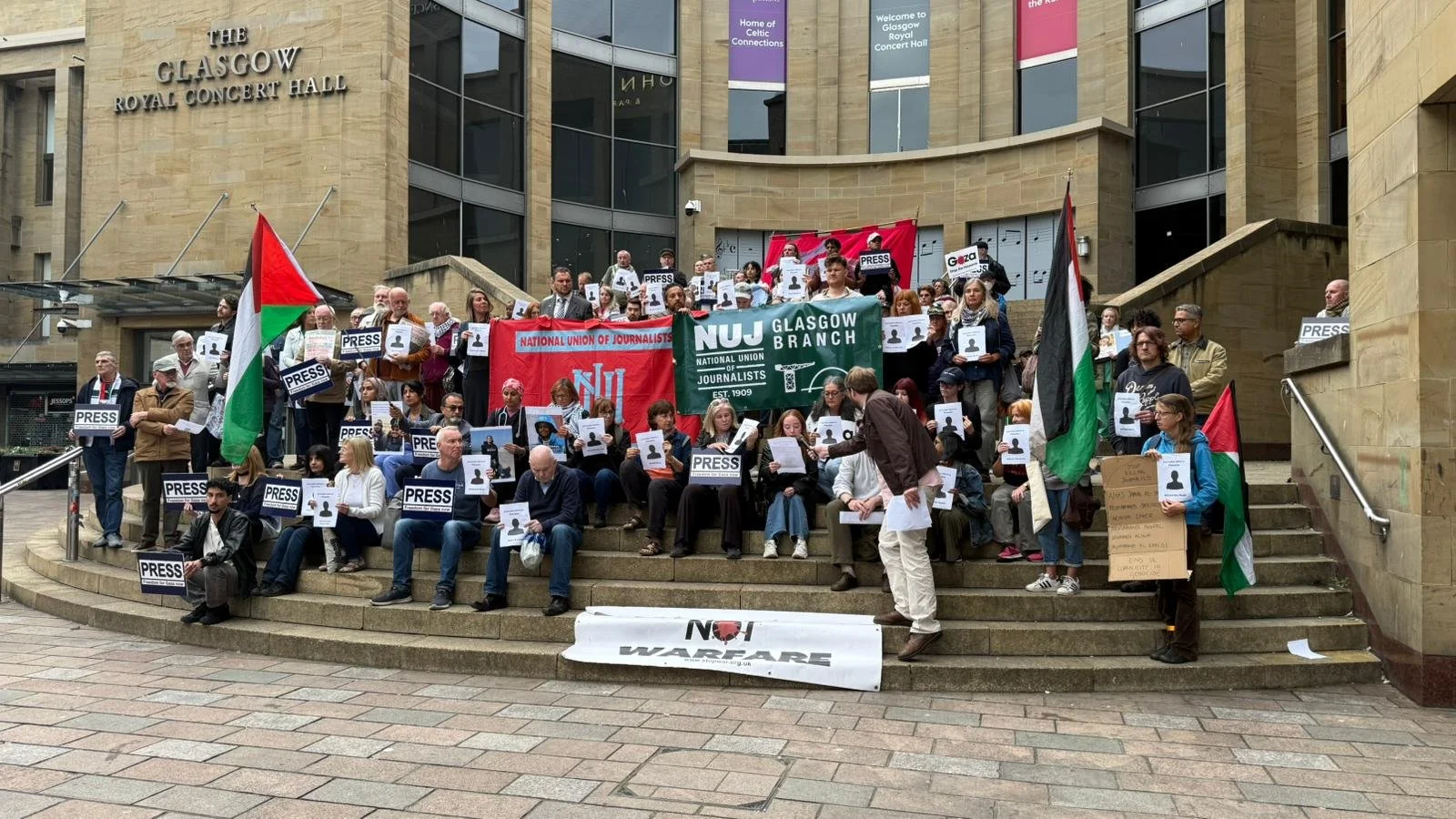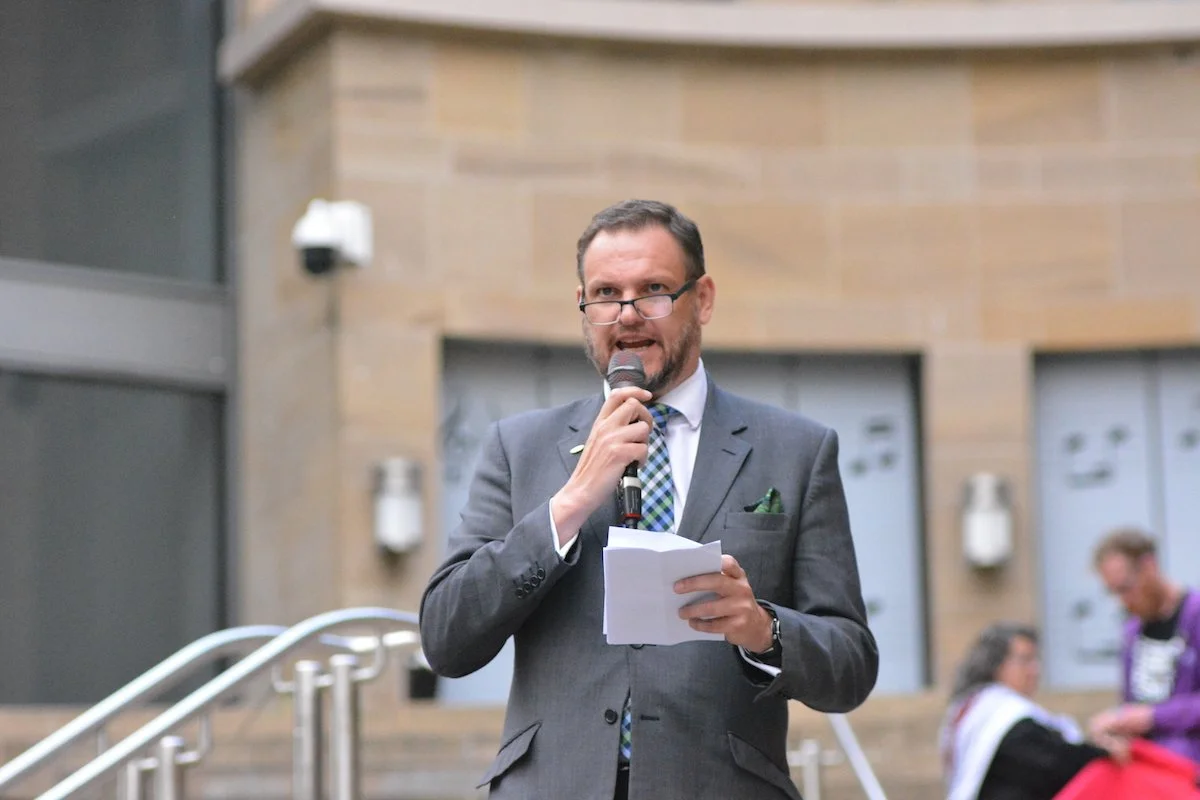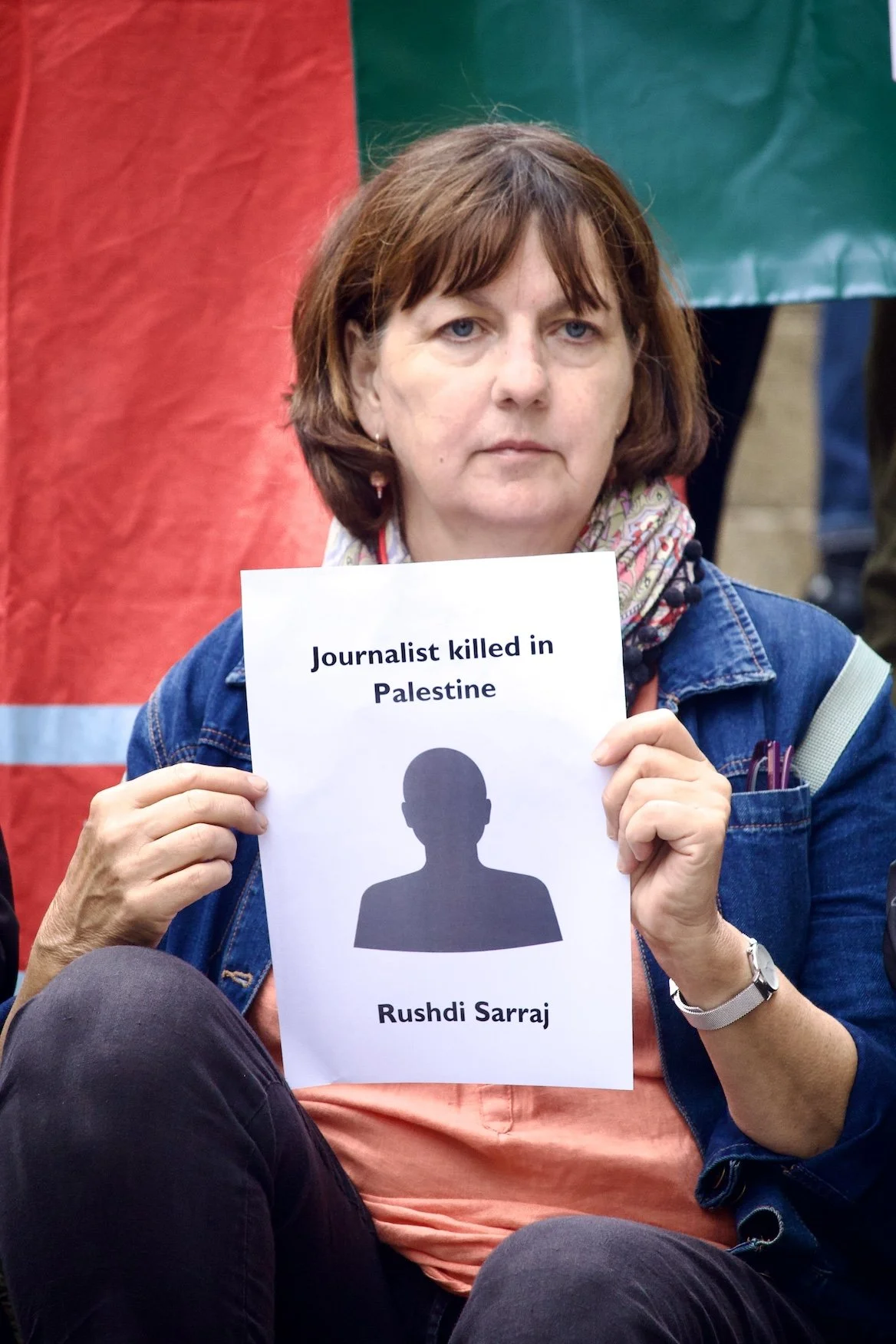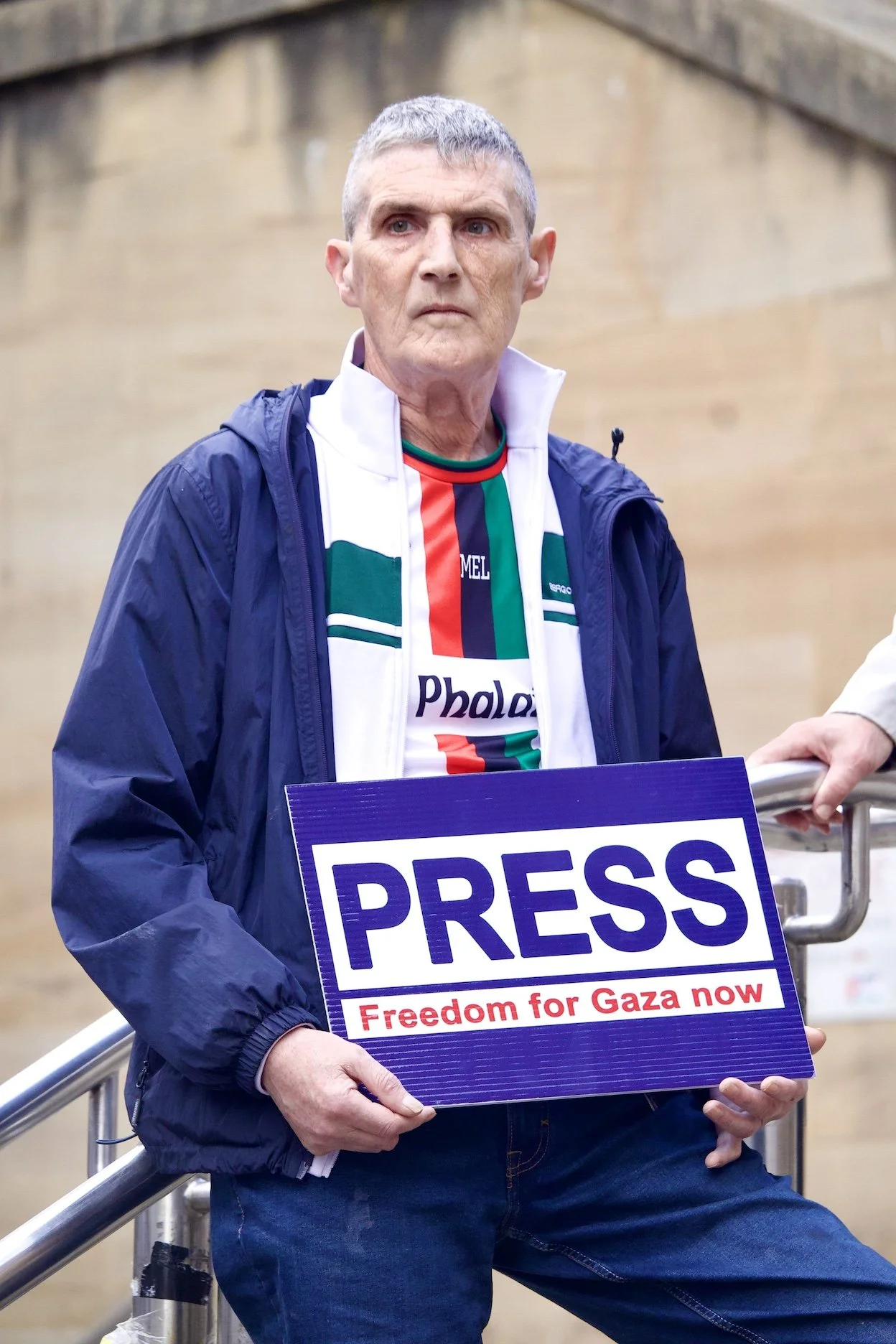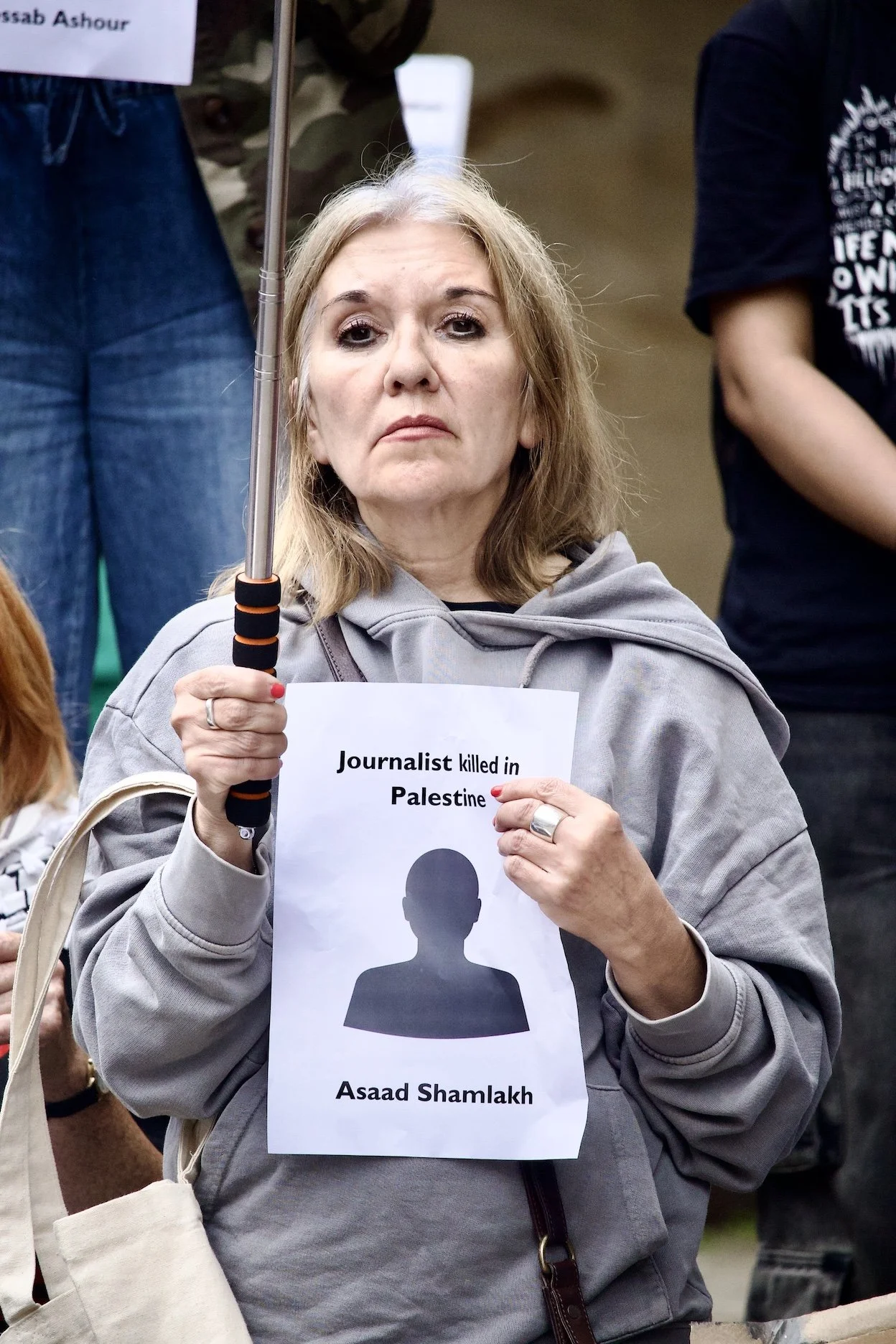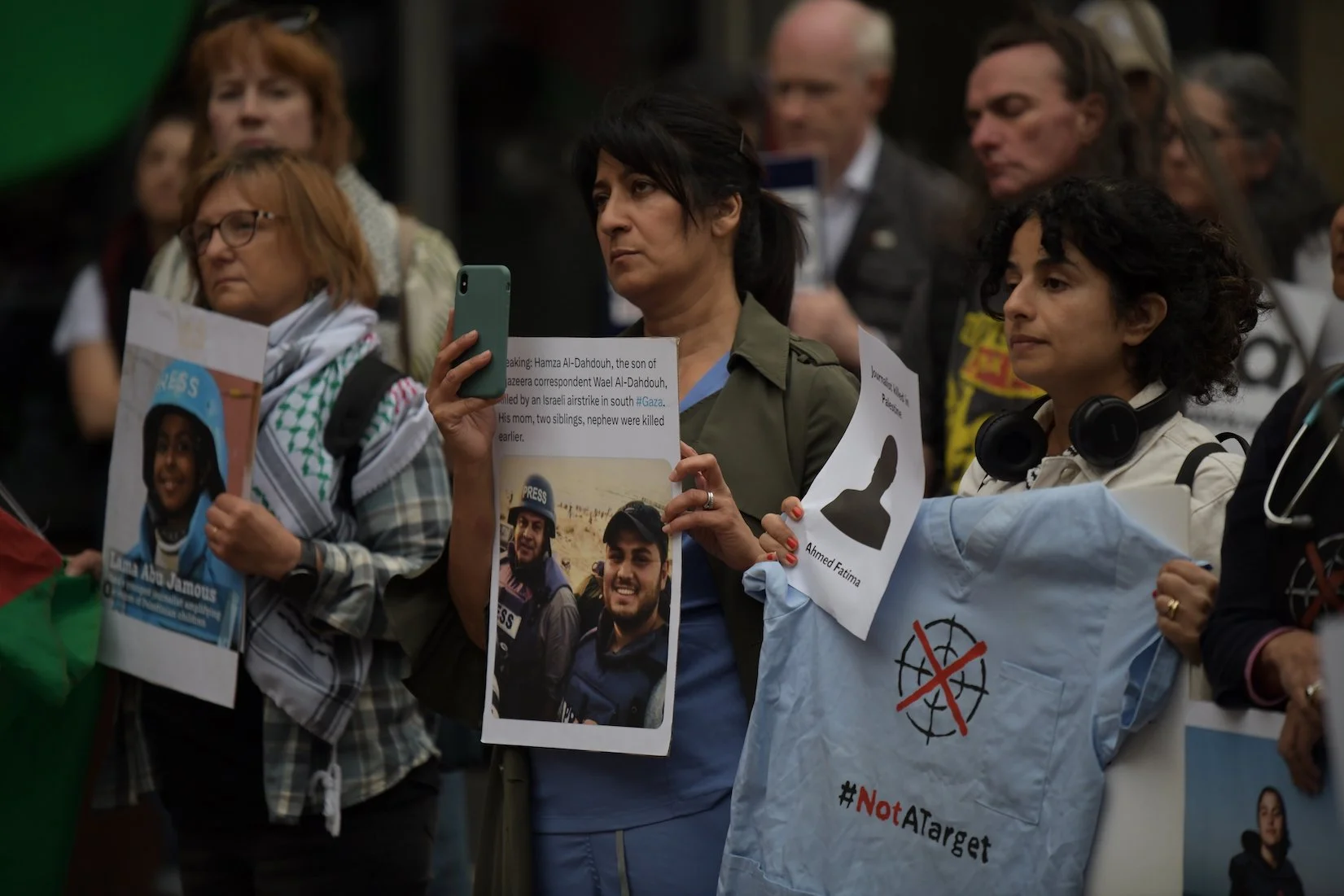Glasgow journalists rally in solidarity with killed colleagues in Gaza
Following Israel’s targeted killing of five journalists and media workers outside the al-Shifa hospital in Gaza on 10 August, the Glasgow branch of the National Union of Journalists organised a vigil at Buchanan steps – calling for press freedom for Gaza, now.
Journalists and media workers at the vigil for Palestinian journalists killed by Israel | Photo by Sadia Sikander
By Sadia Sikander
On Friday 22 August, the National Union of Journalists (NUJ) Glasgow organised a protest to condemn Israel’s ongoing slaughter of media workers and civilians in Gaza.
At a time when reporters are being killed simply for doing their jobs, the vigil organised by NUJ Glasgow was more than a call for press freedom – it was a reminder of our shared duty to speak the truth, hold power to account, and never stay silent in the face of injustice.
Journalists are not statistics
NUJ national organiser for Scotland, Nick McGowan-Lowe | Photo by Sadia Sikander
Speaking at the demo, NUJ national organiser for Scotland, Nick McGowan-Lowe, told the crowd:
“The huge number of journalists who've been killed are not just statistics. These are our colleagues, our brothers and sisters in this profession. People who chose the same path many of us here have to inform, to question, to shine light where there's darkness. They chose journalism and they have paid with their lives. So I ask you now what we will do in response.
“We're demanding an immediate end to the targeting of journalists by the Israeli government. We're demanding an independent international investigation into every single death and full accountability under international law for those responsible. We must pressure not just our governments but our media employers too.”
When I asked him about the protest, he added:
“The situation in Gaza is beyond belief. Journalists are being systematically targeted for trying to do their job, while the BBC still offers biased coverage. The greatest mistake the media can make is to look away. What’s happening is not only a media issue, it’s a humanitarian issue. Without journalists exposing the truth, how can we hold governments to account?”
“We've had a fantastic turnout over a cause that we should be absolutely passionate about. The situation in Gaza is beyond belief. What we're here to talk about is how journalists are being systematically targeted and killed for simply trying to do their job and expose what is happening out there…
“The greatest mistake the media can make is to move away, to take our eyes away from this. We have to be absolutely reminded about what is happening in front of us – Israel is not letting any journalists into Gaza and they are systematically targeting those who are working there, who are in the most horrific conditions, and who are being killed at a rate we have never seen in any other conflict.
“What we've seen today is that people see the targeting of journalists and the attack on journalism as not a media issue, it's not a Gaza issue, it's an international issue, it's a humanitarian issue. Because without journalists there to expose what is happening, how are we supposed to hold governments to account for their actions?”
Attendees took turns to read the names of the journalists killed in Gaza | Photo by Anastazia Hart
We cannot normalise genocide
Laura Webster, editor of The National and Sunday National, also addressed the protest:
“People are becoming numb to the scale of the horror. We are normalising genocide on a global scale. The very least journalists can do here in the UK is speak up for our colleagues. Maybe you think that you're not an expert in politics or conflict or that it's not your place as a reporter to speak up.
“I'm sure that among the hundreds of journalists killed in Gaza, there were general news reporters who would not have considered themselves to be experts in war reporting, but they were left with no choice as bombs were dropped over them and their colleagues were picked off one by one. We all have a duty to say something and stand in solidarity with our colleagues.”
Demonstrators held up names of journalists killed in Palestine | Photos by Dylan Lombard
Laura urged her peers:
“The questions we ask those in power can have major impact on the political agenda, but if we don't ask, we don't get. I urge journalists across Scotland and the UK to use their platform with a conscience. Ask politicians why we are still exporting weapons to Israel. Ask them why we give information collected from spy planes to a government accused of genocide, a government whose leaders face arrest warrants from the International Criminal Court.
“Ask institutions why they continue to operate contracts with firms profiting from genocide. Ask why taxpayers' money is being given to companies whose weapons have killed not just these journalists we're remembering tonight, but tens of thousands of people. Do not think there is nothing to do.”
When speaking to her later, she told me:
“In recent months, the western media has begun to do more – it seems to be acknowledging the horror taking place in Gaza in a way maybe it was not before, but we have to say as well this is still not enough…
“We need more journalists to speak up sooner. There were a lot of columnists and commentators at the rally this evening, but I was disappointed to not see other editors and news reporters from other newspapers. As far as I can see myself and my colleagues from The National were the only ones here from a newspaper…
“Journalists have to be impartial, unbiased but when are talking about genocide you can’t be impartial – there are not two sides to show. We have to work together to make change happen to use our platform responsibly. As journalists there is nothing wrong with having conscious – compassion journalism makes you a better journalist.”
Solidarity is an act of humanity
Protesters at the rally | Photo by Ross Samson
The Glasgow protest drew support from the Stop the War Coalition, the Glasgow Trades Union Council, freelance photographers, and fellow journalists – all present to express their pain and concerns at this ongoing injustice. By organising this protest, the National Union of Journalists has shown that Gaza journalists are not alone.
Our colleagues in Gaza are putting their lives on the line every single day just to tell the world what is happening. Standing with them is not just an act of solidarity, it is an act of humanity. If we don’t raise our voices now, more of our colleagues will be silenced. This is why journalists came together today – to say that their lives matter, that killing journalists means they are trying to hide the truth, and we will not look away.
